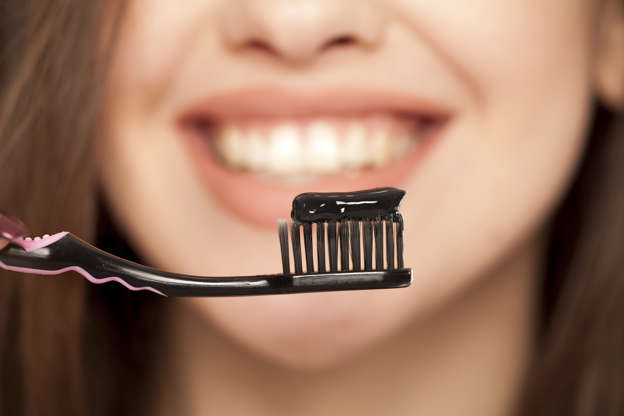Charcoal has a long history of use, with its use intra-orally stemming from the capacity of roughly ground charcoal to abrade away stains and deposits on teeth and absorb noxious substances. These days, you will find charcoal in dental products, beauty products and even foods, such as bread and smoothies.
Information about charcoal dentifrices has been published in the British Dental Journal (BDJ) May 2019* paper which reviews the literature available, concluding that there is a lack of scientific data to support the use of these pastes and powders.
In summary, it concludes that:
- Most charcoal toothpastes do not contain fluoride and of the ones that do, consumers may still remain at increased risk of caries due to the absorptive capacity of activated charcoal; it has the capacity to remove fluoride and other active ions from toothpaste.
- Many of the charcoal-based dentifrices make claims of low abrasiveness; however, to date, these claims have not been independently verified. Particle size can influence the abrasiveness of the dentifrice.
- ‘Possible health risks exist’ considered to be related to the possible inclusion of human carcinogenic polyaromatic hydrocarbons in charcoal and the use of bentonite clay in some charcoal-based dentifrices. Bentonite clay is added due to its suggested ability to aid the binding properties of charcoal, ‘holding’ plaque, bacteria and stained material in the pores of the charcoal (and clay) which is brushed away leaving the surface of the tooth free of any deposits.
- Possible accumulation of charcoal particles in the periodontal pockets of patients with established periodontal disease can occur. This could result in grey/black discoloration of the tissues.
- Staining of the cavosurface margins and surface defects of composite restorations can occur. This can compromise aesthetics, particularly with anterior veneers or crowns with less than perfect supragingival margins.
The paper notes that there is a difference between whitening and bleaching teeth, and as with many over-the-counter-whitening products, these pastes and powders do not intrinsically affect tooth color but simply act by removing surface stain. It was reported that insufficient evidence was found to support claims of tooth whitening, let alone a bleaching effect.
In comparison to conventional oral hygiene product marketing, many charcoal dentifrices use marketing strategies that are attractive to consumers, by making use of wholesome words such as ‘natural’, ‘eco-friendly’, ‘organic’ and ‘herbal’. These terms were used in 88% of dentifrices examined, while 54% used at least two of these consumer-attracting terms.
With Australia’s Oral Health Tracker reporting only half of Australian adults (18+ years) brush their teeth twice per day, the marketing of charcoal dentifrices, which has led to an increase in people brushing their teeth once, if not twice per day, notes that the BDJ paper, be considered a positive.
It is hoped that through education, patients who choose to use non-fluoridated dentifrices transition to use evidence-based products containing fluoride.
*Based on the article by Mikaela Chinotti, ADA Oral Health Promoter, published at the ADA News Bulletin, August 2019.
